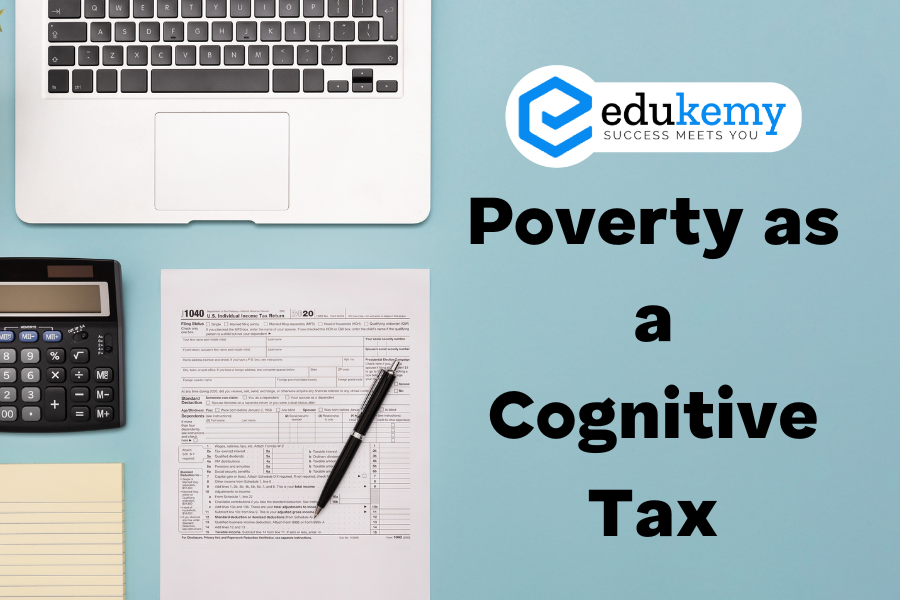
Poverty, often perceived solely through the lens of financial deprivation, is a multidimensional phenomenon that exacts a profound toll on individuals beyond the constraints of their bank accounts. It manifests as a cognitive tax, imposing significant burdens on mental faculties and decision-making processes. Beyond the tangible struggles of scarcity, poverty infiltrates the mind, depleting cognitive resources and impairing executive functions crucial for navigating life’s complexities. This cognitive tax exacts a heavy toll, shaping perceptions, priorities, and opportunities, perpetuating a vicious cycle of disadvantage. Understanding poverty through the lens of cognitive taxation illuminates its far-reaching impacts, emphasizing the urgent need for holistic approaches to address its enduring grip on individuals and societies.
Contents
Poverty as a Cognitive Tax:
- Chronic Poverty and its Consequences:
- Long-term Impact: Chronic poverty is associated with various challenges, including health difficulties, educational failures, mental health issues, and impoverished aspirations.
- Cognitive Depletion: Researchers argue that poverty acts as a ‘cognitive tax’ on the poor, leading to cognitive depletion due to the constant mental energy spent managing the challenges of poverty.
- Mental Bandwidth and Cognitive Burden:
- Management of Poverty: Individuals in poverty expend a significant amount of mental energy in managing the state of poverty.
- Reduced Mental Bandwidth: Poverty reduces a person’s mental bandwidth, hindering effective management of other aspects of their lives.
- Correlation Between Poverty and Counterproductive Behavior:
- Studies Indicating Correlation: Research suggests a correlation between poverty and counterproductive behaviors.
- Behavioral Patterns: Poor individuals may engage in less preventive healthcare, struggle with adherence to medication regimens, exhibit lower productivity at work, demonstrate less attentive parenting, and face challenges in managing finances.
- Environmental Conditions and Behavioral Outcomes:
- Impact of Environmental Factors: Environmental conditions in poverty, such as predatory lending practices and unreliable transportation, contribute to counterproductive behaviors.
- Financial Literacy: Lower levels of formal education may result in financial illiteracy, contributing to adverse financial management.
- Cognitive Burden Equivalent to IQ Loss:
- Research Finding: The mental burden imposed by poverty has been compared to a loss of 13 IQ points.
- Implications: Poverty not only signifies a monetary shortfall but also leads to a concurrent scarcity of cognitive resources.
- Case for Welfare State and Inclusive Growth:
- Policy Implications: The findings strengthen the case for the establishment of a welfare state and the pursuit of inclusive growth policies.
- Addressing Root Causes: Recognizing poverty as a cognitive tax underscores the importance of addressing the root causes to break the cycle of counterproductive behaviors.
Conclusion: Understanding poverty as a cognitive tax emphasizes the need for holistic approaches that go beyond addressing financial deficits. The findings underscore the importance of welfare state initiatives and inclusive growth strategies to alleviate the cognitive burden associated with poverty and promote overall well-being.
FAQs
Q: What is Poverty as a Cognitive Tax?
Poverty as a cognitive tax refers to the mental burden and cognitive load experienced by individuals living in poverty due to constant financial stressors. It encompasses the idea that poverty consumes mental bandwidth, leaving fewer cognitive resources available for other tasks and decision-making processes.
Q: How does Poverty Impose a Cognitive Tax?
Living in poverty often entails grappling with daily concerns such as insufficient income to cover basic needs, unstable housing, and limited access to healthcare and education. These stressors demand constant attention and decision-making, diverting cognitive resources away from tasks like problem-solving, planning, and self-control.
Q: What are the Effects of Poverty as a Cognitive Tax?
The cognitive tax imposed by poverty can lead to diminished cognitive functioning, including reduced attention, memory, and executive function skills. It can hinder academic and job performance, exacerbate mental health issues, and perpetuate the cycle of poverty by impairing individuals’ ability to make long-term decisions that could improve their circumstances.
Q: Can Poverty as a Cognitive Tax be Mitigated?
Efforts to alleviate poverty should not only focus on economic assistance but also address the cognitive burden it imposes. Interventions such as providing access to mental health services, financial education, childcare support, and affordable healthcare can help alleviate the cognitive tax associated with poverty, enabling individuals to better focus on improving their socioeconomic status.
Q: What are the Implications for Policy and Society?
Recognizing poverty as a cognitive tax underscores the importance of holistic approaches to poverty alleviation that address both economic and cognitive factors. Policymakers should design interventions that reduce financial stressors, enhance cognitive resources through education and support programs, and create opportunities for economic mobility. Additionally, societal attitudes and stigmas surrounding poverty must be addressed to foster empathy and support for those experiencing its cognitive burdens.
In case you still have your doubts, contact us on 9811333901.
For UPSC Prelims Resources, Click here
For Daily Updates and Study Material:
Join our Telegram Channel – Edukemy for IAS
- 1. Learn through Videos – here
- 2. Be Exam Ready by Practicing Daily MCQs – here
- 3. Daily Newsletter – Get all your Current Affairs Covered – here
- 4. Mains Answer Writing Practice – here

